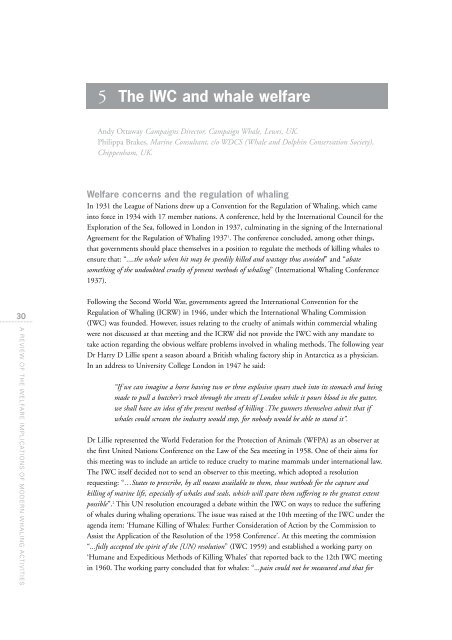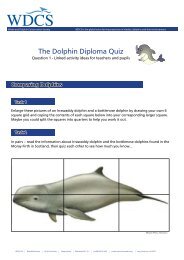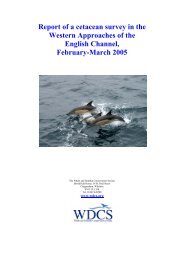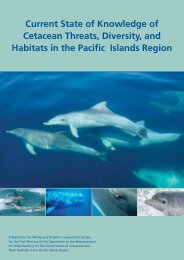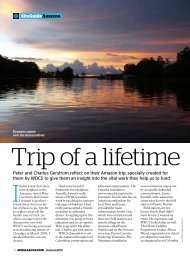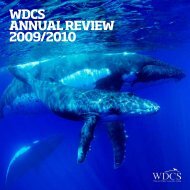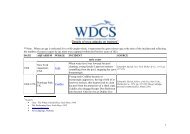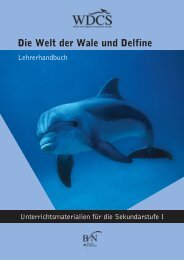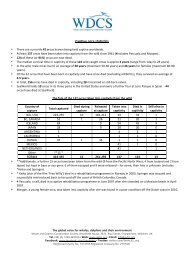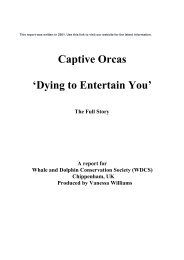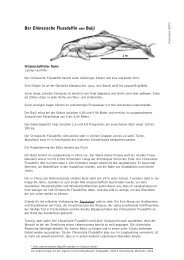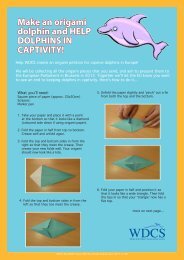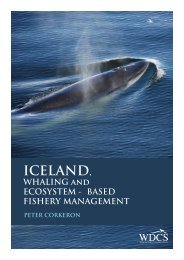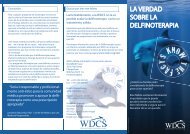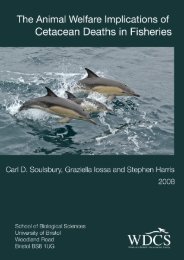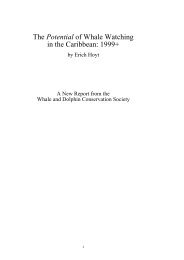TROUBLED WATERS - Whale and Dolphin Conservation Society
TROUBLED WATERS - Whale and Dolphin Conservation Society
TROUBLED WATERS - Whale and Dolphin Conservation Society
You also want an ePaper? Increase the reach of your titles
YUMPU automatically turns print PDFs into web optimized ePapers that Google loves.
30<br />
A REVIEW OF THE WELFARE IMPLICATIONS OF MODERN WHALING ACTIVITIES<br />
5 The IWC <strong>and</strong> whale welfare<br />
Andy Ottaway Campaigns Director, Campaign <strong>Whale</strong>, Lewes, UK.<br />
Philippa Brakes, Marine Consultant, c/o WDCS (<strong>Whale</strong> <strong>and</strong> <strong>Dolphin</strong> <strong>Conservation</strong> <strong>Society</strong>),<br />
Chippenham, UK.<br />
Welfare concerns <strong>and</strong> the regulation of whaling<br />
In 1931 the League of Nations drew up a Convention for the Regulation of Whaling, which came<br />
into force in 1934 with 17 member nations. A conference, held by the International Council for the<br />
Exploration of the Sea, followed in London in 1937, culminating in the signing of the International<br />
Agreement for the Regulation of Whaling 1937 1 . The conference concluded, among other things,<br />
that governments should place themselves in a position to regulate the methods of killing whales to<br />
ensure that: “....the whale when hit may be speedily killed <strong>and</strong> wastage thus avoided” <strong>and</strong> “abate<br />
something of the undoubted cruelty of present methods of whaling” (International Whaling Conference<br />
1937).<br />
Following the Second World War, governments agreed the International Convention for the<br />
Regulation of Whaling (ICRW) in 1946, under which the International Whaling Commission<br />
(IWC) was founded. However, issues relating to the cruelty of animals within commercial whaling<br />
were not discussed at that meeting <strong>and</strong> the ICRW did not provide the IWC with any m<strong>and</strong>ate to<br />
take action regarding the obvious welfare problems involved in whaling methods. The following year<br />
Dr Harry D Lillie spent a season aboard a British whaling factory ship in Antarctica as a physician.<br />
In an address to University College London in 1947 he said:<br />
“If we can imagine a horse having two or three explosive spears stuck into its stomach <strong>and</strong> being<br />
made to pull a butcher’s truck through the streets of London while it pours blood in the gutter,<br />
we shall have an idea of the present method of killing .The gunners themselves admit that if<br />
whales could scream the industry would stop, for nobody would be able to st<strong>and</strong> it”.<br />
Dr Lillie represented the World Federation for the Protection of Animals (WFPA) as an observer at<br />
the first United Nations Conference on the Law of the Sea meeting in 1958. One of their aims for<br />
this meeting was to include an article to reduce cruelty to marine mammals under international law.<br />
The IWC itself decided not to send an observer to this meeting, which adopted a resolution<br />
requesting: “…States to prescribe, by all means available to them, those methods for the capture <strong>and</strong><br />
killing of marine life, especially of whales <strong>and</strong> seals, which will spare them suffering to the greatest extent<br />
possible”. 2 This UN resolution encouraged a debate within the IWC on ways to reduce the suffering<br />
of whales during whaling operations. The issue was raised at the 10th meeting of the IWC under the<br />
agenda item: ‘Humane Killing of <strong>Whale</strong>s: Further Consideration of Action by the Commission to<br />
Assist the Application of the Resolution of the 1958 Conference’. At this meeting the commission<br />
“...fully accepted the spirit of the [UN) resolution” (IWC 1959) <strong>and</strong> established a working party on<br />
‘Humane <strong>and</strong> Expeditious Methods of Killing <strong>Whale</strong>s’ that reported back to the 12th IWC meeting<br />
in 1960. The working party concluded that for whales: “...pain could not be measured <strong>and</strong> that for


